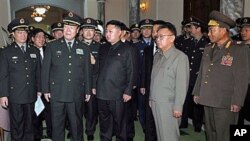China has been a major player in the six-party talks aimed at persuading North Korea to give up its nuclear weapons program. The conventional wisdom is that China is North Korea's staunchest ally and greatest source of support in the international community.
Bruce Bennett, China expert with the RAND Corporation, said that economically, Beijing is Pyongyang's major supplier of food and energy.
"China is certainly propping up North Korea," said Bennett. "Just for subsistence living, North Korea requires something between five and five-and-a-half-million tons of grain - mainly rice and corn - each year in order to feed its people. And that's just at a subsistence level. And North Korea is only producing about four million. So it's about 20 percent or so short and China makes up a fair amount of that deficit. They [the Chinese] also send consumer goods into the North, and about the only major thing they get back, they have bought up mineral rights, they have rights to a couple of ports on the Sea of Japan - but they don't get a lot of goods back from North Korea."
Allies and neighbors
The two countries also share a [1,360 kilometer] border, and there is a significant Korean minority population in northeast China.
Politically, since 2003, China has been the host of the six-party talks bringing together, in addition to Beijing, the United States, Russia, Japan, South Korea and North Korea. The aim of these negotiations is to persuade Pyongyang to eliminate its nuclear weapons capabilities. The talks are in limbo, however, and the members haven't met in more than a year.
Analysts say China also provides political cover to North Korea, especially at the United Nations.
"More importantly, if you go back to the case where North Korea sank a South Korean warship back in March, and China refused to recognize that in the U.N. discussions, and therefore made it impossible to take any serious action against North Korea in the U.N.," said Bennett.
Beijing Placates Pyongyang
Analysts say China also defended North Korea after Pyongyang fired artillery shells last month at a South Korean controlled island. Beijing urged calm and called for a return to the six-party talks - a proposal rejected by the United States, South Korea and Japan. They said they did not want to reward Pyongyang's aggressive actions.
Experts, such as Adam Segal from the Council on Foreign Relations, though, say despite Beijing's close economic and political ties to North Korea, the Chinese over the years have become more and more disheartened with Kim Jong-il's government.
"They've grown increasingly frustrated with what they saw as the erratic behavior of the Kim regime and constantly were trying to convince Kim that he could undergo economic reforms but still hold on to political power," said Segal. "So you saw these visits of Kim to Shanghai and Shenzen and [other] places in China. But the Chinese didn't really gather any traction on that."
Leverage in question
Many analysts ask the question: how much leverage does China have on North Korea to persuade it to give up its nuclear weapons program and end its aggressive behavior? President Barack Obama recently spoke to his Chinese counterpart, Hu Jintao, urging Beijing to send a clear message to Pyongyang saying that "its provocations are unacceptable."
Segal said the Chinese like to say they don't have as much leverage as the Americans think they do. "But the problem for the Chinese is that right now, they think they don't have anything between doing nothing and totally cutting North Korea off, which they are afraid would cause the collapse of North Korea. So they don't have any kind of leverage in between those two things, which means that they feel like they can't do anything."
Bennett said the Chinese see a collapse of North Korea as a disaster for them. "The Bank of South Korea has estimated that in a collapse, you could get three million refugees. And given the population distribution in North Korea, and allegiances, probably two, two and a half million of those would head towards the Chinese border - and that's a mass of people that China is unprepared to deal with."
Some analysts say China still has some leverage, especially in the economic sphere. But they also say Chinese leaders must figure out how much pressure they can exert and how far they can go before triggering instability in North Korea and potentially, an even greater crisis.




